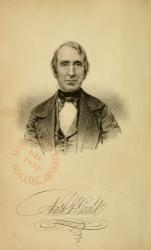1741 - 1797 Author of "Wherefore Should Man, Frail Child of Clay" in The Cyber Hymnal Enfield, William , LL.D., born at Sudbury, Suffolk, March 29, 1741, of poor parents. Through the assistance of Mr. Hextall, the local Dissenting Minister, at 17 he entered the Daventry Academy under Dr. Ashworth. His first pastorate was of the congregation at Benn's Garden, Liverpool, to which he ministered from 1763 to 1770. In conjunction with Rev. J. Brekell of Key St. chapel, he edited
A New Collection of Psalms proper for Christian Worship, in three parts. I. Psalms of David, &c. II. Psalms of Praise to God. III. Psalms on various Subjects. Liverpool. Printed in the year 1764. Known as the Liverpool Old Collection; Later eds., 1767, 1770, 1787. In this last, 60 more hymns are added to the 3rd part.
From 1770 to 1785 Enfield was at Warrington, as minister to the Old Presbyterian congregation, and as teacher of Belles-lettres and other subjects, in the Dissenting Academy founded there in 1757. He published in 1774, The Speaker; 1783, Institutes of Natural Philosophy, and other works, including:—
Hymns for Public Worship: selected from Various Authors, and intended as a supplement to Dr. Watts’s Psalms. Warrington. Printed for the Editor, 1772. 3rd ed. 1789. London. Printed for J. Johnson, St. Paul's Churchyard, and W. Kyres, Warrington. Contains 160 hymns, rather more than half being the same as in the Liverpool Collection. In this Collection some of Mrs. Barbauld’s hymns appeared for the first time.
From Warrington he proceeded to Norwich as pastor of the Octagon chapel, and died there Nov. 3, 1797. In 1791 he published an abridgment of Brucker's History of Philosophy , and at the time of his death was engaged with Dr. J. Aikin, son of his late colleague at the Warrington Academy, in bringing out a General Biographical Dictionar , vol. i. 1796. He also published A Selection of Hymns for Social Worship. Norwich. Printed by J. March for J. Johnson, St. Paul's Church¬yard, London, 1795. 2nd ed., 1797 ; 3rd ed., 1802. Lon-don, J. Johnson. Printed by W. Eyres, Horse Market, Warrington. Contains 232 hymns, more than half by Watts, and of the rest 93 were retained from the Warrington Collection.
In this Collection Enfield's own hymns first appeared, “Behold where in a mortal form" (Example of Christ); "Wherefore should man, frail child of clay" (Humility); and "O Thou, through all thy works adored" (God the Ruler of Nature). They are characteristic of the "moral preacher" and the Unitarian, and in taste are unexceptionable. Dr. Enfield received his degree from Edinburgh University. On his death Johnson brought out 3 volumes of his Sermons "on Practical Subjects,” with a Memoir by Dr. Aikin. [Rev. Valentine D. Davis, B.A.]
-- John Julian, Dictionary of Hymnology (1907)
William Enfield


 My Starred Hymns
My Starred Hymns


